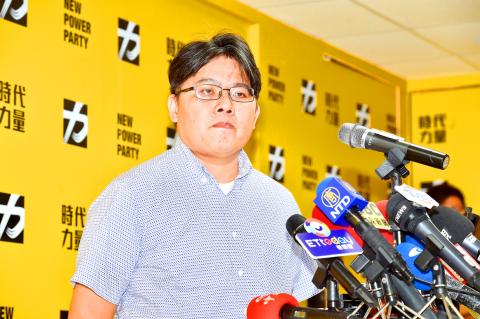The Democratic Progressive Party (DPP) is striving to build cooperation among pan-green parties in light of recent developments in the political scene, DPP Chairman Cho Jung-tai (卓榮泰) said yesterday.
Cho said he had contacted New Power Party (NPP) Chairman Chiu Hsien-chih (邱顯智) to schedule a meeting next week to discuss forging an alliance under the proposed banner of “safeguarding Greater Taiwan.”
The move comes after Legislator Freddy Lim (林昶佐) on Thursday quit the NPP to run as an independent in his Taipei electoral district, while Taipei Mayor Ko Wen-je (柯文哲) on Wednesday announced that he was forming a new party.

Photo: Tu Chien-jung, Taipei Times
“Our talk will focus on collaboration, working together for Taiwan’s best interests and to implement national development programs,” Cho said of the planned meeting with Chiu. “The DPP is looking to help pro-Taiwan forces.”
Chiu yesterday met with NPP Legislator Huang Kuo-chang (黃國昌), after which he said that the party would support President Tsai Ing-wen’s (蔡英文) re-election bid.
“I look forward to discussing with Cho the nomination of candidates in competing electorates,” Chiu said. “I also want to talk to Cho about judicial reform, amending injustices in housing policies, parliamentary reform and other important issues.”
Earlier yesterday, Cho wrote on Facebook about recent political developments, saying that the “DPP does not want to see events creating distrust and break-ups.”
“The DPP has always sought to see the pro-Taiwan forces grow and become stronger,” he wrote.
Lim’s departure has sparked conflict in the NPP, while Ko’s action has divided previously cooperative partnerships, he wrote.
“The coalition of forces opposed to China is breaking up and the pro-Taiwan force is splitting,” Cho wrote. “It is regretful to see this happening.”
“When China sees that our pro-Taiwan forces cannot work together due to internal conflicts, it will see that its opportunity has come,” he said.
“The DPP is willing to offer front-line troops as it forges an alliance for dialogue and cooperation among like-minded parties and groups,” he said.

Taiwanese can file complaints with the Tourism Administration to report travel agencies if their activities caused termination of a person’s citizenship, Mainland Affairs Council Minister Chiu Chui-cheng (邱垂正) said yesterday, after a podcaster highlighted a case in which a person’s citizenship was canceled for receiving a single-use Chinese passport to enter Russia. The council is aware of incidents in which people who signed up through Chinese travel agencies for tours of Russia were told they could obtain Russian visas and fast-track border clearance, Chiu told reporters on the sidelines of an event in Taipei. However, the travel agencies actually applied

New measures aimed at making Taiwan more attractive to foreign professionals came into effect this month, the National Development Council said yesterday. Among the changes, international students at Taiwanese universities would be able to work in Taiwan without a work permit in the two years after they graduate, explainer materials provided by the council said. In addition, foreign nationals who graduated from one of the world’s top 200 universities within the past five years can also apply for a two-year open work permit. Previously, those graduates would have needed to apply for a work permit using point-based criteria or have a Taiwanese company

The Shilin District Prosecutors’ Office yesterday indicted two Taiwanese and issued a wanted notice for Pete Liu (劉作虎), founder of Shenzhen-based smartphone manufacturer OnePlus Technology Co (萬普拉斯科技), for allegedly contravening the Act Governing Relations Between the People of the Taiwan Area and the Mainland Area (臺灣地區與大陸地區人民關係條例) by poaching 70 engineers in Taiwan. Liu allegedly traveled to Taiwan at the end of 2014 and met with a Taiwanese man surnamed Lin (林) to discuss establishing a mobile software research and development (R&D) team in Taiwan, prosecutors said. Without approval from the government, Lin, following Liu’s instructions, recruited more than 70 software

Taiwanese singer Jay Chou (周杰倫) plans to take to the courts of the Australian Open for the first time as a competitor in the high-stakes 1 Point Slam. The Australian Open yesterday afternoon announced the news on its official Instagram account, welcoming Chou — who celebrates his 47th birthday on Sunday — to the star-studded lineup of the tournament’s signature warm-up event. “From being the King of Mandarin Pop filling stadiums with his music to being Kato from The Green Hornet and now shifting focus to being a dedicated tennis player — welcome @jaychou to the 1 Point Slam and #AusOpen,” the